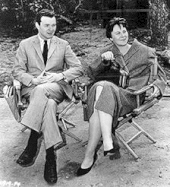1962 film
The book was made into the well-received 1962 film with the same title, starring Gregory Peck as Atticus Finch. The film's producer, Alan J. Pakula, remembered Universal Pictures executives questioning him about a potential script: "They said, 'What story do you plan to tell for the film?' I said, 'Have you read the book?' They said, 'Yes.' I said, 'That's the story.'" The movie was a hit at the box office, quickly grossing more than $20 million from a $2-million budget. It won three Oscars: Best Actor for Gregory Peck, Best Art Direction-Set Decoration, Black-and-White, and Best Writing, Screenplay Based on Material from Another Medium for Horton Foote. It was nominated for five more Oscars including Best Actress in a Supporting Role for Mary Badham, the actress who played Scout.
Harper Lee was pleased with the movie, saying: "In that film the man and the part met... I've had many, many offers to turn it into musicals, into TV or stage plays, but I've always refused. That film was a work of art." Peck met Lee's father, the model for Atticus, before the filming. Lee's father died before the film's release, and Lee was so impressed with Peck's performance that she gave him her father's pocketwatch, which he had with him the evening he was awarded the Oscar for Best Actor. Years later, he was reluctant to tell Lee that the watch was stolen out of his luggage in London Heathrow Airport. When Peck eventually did tell Lee, he said she responded, "'Well, it's only a watch.' Harper—she feels deeply, but she's not a sentimental person about things." Lee and Peck shared a friendship long after the movie was made. Peck's grandson was named "Harper" in her honor.
In May 2005, Lee made an uncharacteristic appearance at the Los Angeles Public Library at the request of Peck's widow Veronique, who said of Lee: "She's like a national treasure. She's someone who has made a difference...with this book. The book is still as strong as it ever was, and so is the film. All the kids in the United States read this book and see the film in the seventh and eighth grades and write papers and essays. My husband used to get thousands and thousands of letters from teachers who would send them to him."
Play
The book has also been adapted as a play by Christopher Sergel. It debuted in 1990 in Monroeville, a town that labels itself "The Literary Capital of Alabama". The play runs every May on the county courthouse grounds and townspeople make up the cast. White male audience members are chosen at the intermission to make up the jury. During the courtroom scene the production moves into the Monroe County Courthouse and the audience is racially segregated. Author Albert Murray said of the relationship of the town to the novel (and the annual performance): "It becomes part of the town ritual, like the religious underpinning of Mardi Gras. With the whole town crowded around the actual courthouse, it's part of a central, civic education—what Monroeville aspires to be."
Sergel's play toured in the UK starting at West Yorkshire Playhouse in Leeds in 2006, and again in 2011 starting at the York Theatre Royal, both productions featuring Duncan Preston as Atticus Finch. The play also opened the 2013 season at Regent's Park Open Air Theatre in London where it played to full houses and starred Robert Sean Leonard as Atticus Finch, his first London appearance in 22 years. The production returned to the venue to close the 2014 season, prior to a UK tour.
According to a National Geographic article, the novel is so revered in Monroeville that people quote lines from it like Scripture; yet Harper Lee herself refused to attend any performances, because "she abhors anything that trades on the book's fame". To underscore this sentiment, Lee demanded that a book of recipes named Calpurnia's Cookbook not be published and sold out of the Monroe County Heritage Museum. David Lister in The Independent states that Lee's refusal to speak to reporters made them desire to interview her all the more, and her silence "makes Bob Dylan look like a media tart". Despite her discouragement, a rising number of tourists made Monroeville their destination, hoping to see Lee's inspiration for the book, or Lee herself. Local residents call them "Mockingbird groupies", and although Lee was not reclusive, she refused publicity and interviews with an emphatic "Hell, no!"


Комментариев нет:
Отправить комментарий